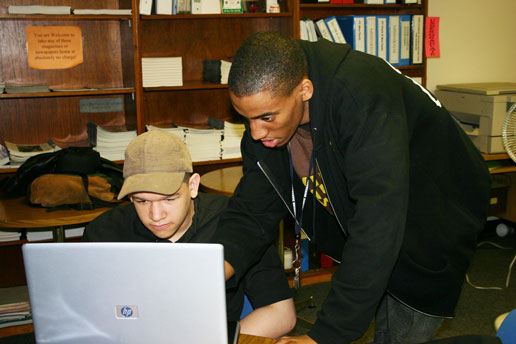Students Learn by Standing in the Shadows

Through a mentoring program sponsored by Polytechnic's Office of Career Services and Cooperative Education, many students are taking a glimpse into their futures. By “shadowing†industry professionals, including many executives, students are learning more about the day-to-day responsibilities that may await them after graduation. Now entering its third year, the program matches students one-on-one with working professionals — first at a dinner, as an icebreaker, and then during visits to the workplace. In 2005, about two dozen students participated. The next installment of the program is scheduled for September.
“The program is important because students have the opportunity to see what individuals in their area of interest actually do, and they learn more about their field of interest,†said Frances Pesochinsky, acting director of Career Services.
As a member of the Society of American Military Engineers, Poly alum Durjodhan “Chris†Ragnauth '03CE '06CE has been actively involved in bringing students and professional engineers together since 2004 — helping to resuscitate a service that previously experienced erratic student participation. According to Ragnauth, working engineers have made themselves readily available to students and are eager to give back to their profession.
“These mentors are chief engineers, CEOs, chief operating officers,†said Ragnauth, a consultant for the Port Authority of New York and New Jersey.
Matthew Nissen '03EE, a design and consulting engineer with EME Group, serves as a mentor. He was attracted to the program because it offered him an opportunity to lend a helping hand to his alma mater. For Nissen, the interaction with a potential future colleague was the most rewarding part of the experience.
Ibn Abdul-Khaaliq '07CS '07CE, a past participant in the “shadowing†program, was paired with a mentor from IBM. “She took me around and gave me a description of her work,†said Abdul-Khaaliq, who added that the experience helped him realize he would prefer to delve into software development as a career, rather than manufacturing.
And while offering networking opportunities and insight into a student's career aspirations are obvious goals of the mentoring program, another benefit is that students may elect to take their career paths into a different direction, one they believe might be even more rewarding.
Pesochinsky would like to increase alumni participation and aims to expand the program to other disciplines outside of engineering.
In addition to the mentoring program, Career Services offers résumé and cover-letter critiques, mock interviews that are videotaped and evaluated, career aptitude tests and on-campus recruiting, which allows students and alumni to apply for jobs online with companies that plan to visit campus.
“I would like to remind the alumni that all the services we provide for our students are also available to our alumni,†Pesochinsky said.
Last year, Career Services reported a 91 percent job-placement success rate, up from 83 percent in 2004. For more information on Career Services, call 646.997.3650.




